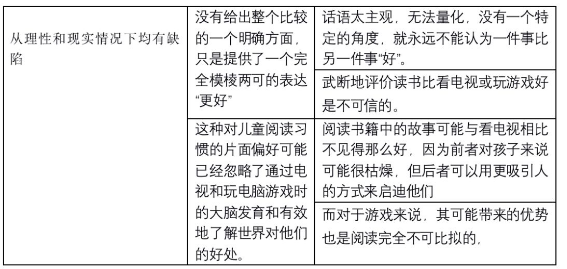Some people think reading stories in books is better than watching TV or playing computer games for children. To what extent do you agree or disagree?
题目大意
有些人认为读书比看电视或玩电脑游戏好。你在多大程度上同意或不同意?
写作思路解析
1.我认为这种观点极其荒谬的主要原因是,它没有给出整个比较的一个明确方面,只是提供了一个完全模棱两可的表达“更好”。话语太主观,无法量化,没有一个特定的角度,就永远不能认为一件事比另一件事“好”。在这个主题中,我们讨论了什么方面来建立比较,或者说,在任何情况下,一个人怎么敢轻率地说一项活动总是“更好”的?对于那些坚信提示中所展示的思想的人来说,他们可能会把注意力集中在成瘾、身体伤害等看太多电视或不停地玩电子游戏可能给孩子带来的不良后果上,然后得出结论,因此,与前两种情况相比,阅读书籍中的故事可能没有那么有害。然而,这背后的体系,也是基于对这些孩子可能遭受的危害的角度,是一个标准,可以让比较有意义。因此,武断地评价读书比看电视或玩游戏好是不可信的。
2.上述短视思维也反映在其偏颇的观点上。这种对儿童阅读习惯的片面偏好可能已经忽略了通过电视和玩电脑游戏时的大脑发育和有效地了解世界对他们的好处。让我们永远不要忽略这样一个事实:如果孩子们用来获取信息和知识的资源相当简单和扁平化他们会缺乏专注力,他们通常需要一种多维的方式,通过生动的视觉灌输来提供他们应该知道的东西。在这种情况下,阅读书籍中的故事可能与看电视相比不见得那么好,因为前者对孩子来说可能很枯燥,但后者可以用更吸引人的方式来启迪他们,而对于游戏来说,其可能带来的优势也是阅读完全不可比拟的,游戏能给儿童提供的是对儿童反应速度和发展即时策略能力的训练。这种技能绝不可能通过读书来获得,而且在大多数青少年的成长过程中也被证明是必要的。
提纲梳理见下
写作示范
The claim given by the topic fails to be persuasive because of its vagueness; the comparison would be meaningless when there is no precise criterion between learning stories by reading books and watching TV or playing computer games.
The main reason why I consider this view extremely absurd is that it didn’t give a clear aspect of the whole comparison but just provide a totally ambiguous expression “better”. The utterance is too subjective to be quantified, and without a specific angle, one thing can never be deemed “better” than another. Just what aspect is discussed in this topic to establish the comparison, or how dares one recklessly to say that an activity would always be “better” under any circumstances? For those who firmly believe the thought exhibited in the prompt, they may focus on the demerits—addictions, the physical damages, etc.—that watching too much TV or relentlessly playing video games may bring about to the children, and then conclude that reading stories in books, therefore, may be not that harmful compared with the former two. The system behind this, however, is also based on the perspective of the blights that may be given to those kids, and it is definitely a criterion that can let the comparison make sense. To arbitrarily evaluate that reading books is better than tv watching or game playing, ergo, is never credible without regulating the outperformance with situations.
The myopic thinking aforementioned is also reflected in its biased outlook. This lopsided preference to children’s reading habits may have already overlooked the benefits to them from effectively learning about the world through television and the brain development during playing computer games. Let us never omit the fact that kids are normally lack of concentration if the resources they use to acquire information and knowledge are rather plain and flattened, and they usually require a multi-dimensional way to provide what they should know through vivid visual injections. In that case, reading stories in books may be relatively dwarfed by watching TV, since the former may be dull to children but the latter can light most things in a more attractive way. As for game playing, the probable edges are totally incomparable with the reading; what games can provide to children is the training on children’s speed of response and the ability to develop instant strategy. Such skills can never be given by book reading, and are also proved necessary among most adolescent development.
In conclusion, I would much agree that every action that is adapted in childhood to realize the multi-aspect development has the unique functions, and the comparisons would be improper without the basis of involving quantifiable elements.


